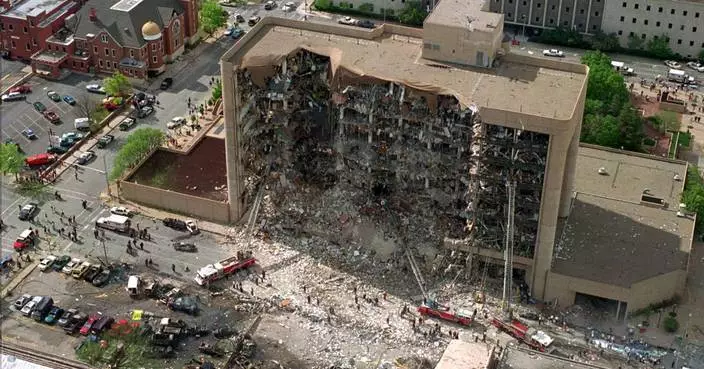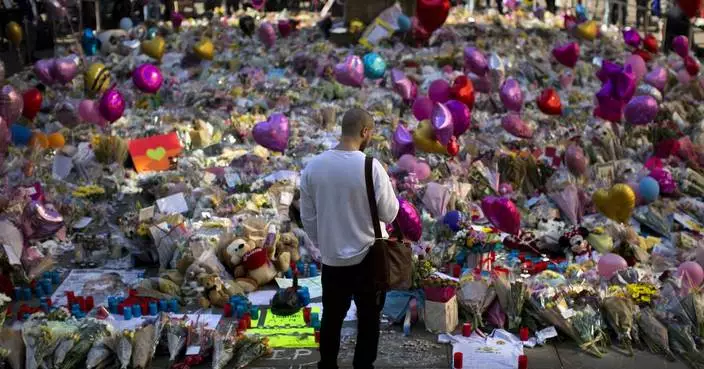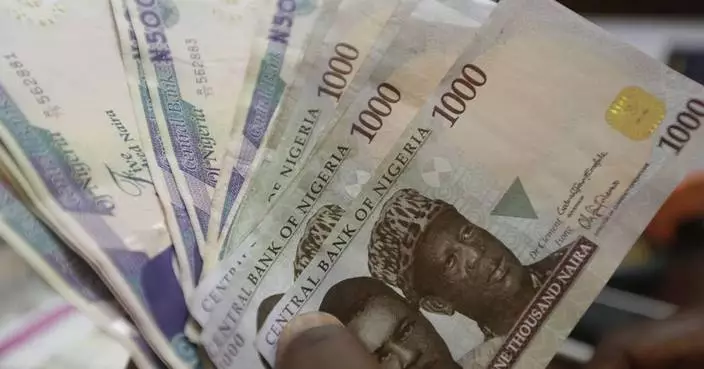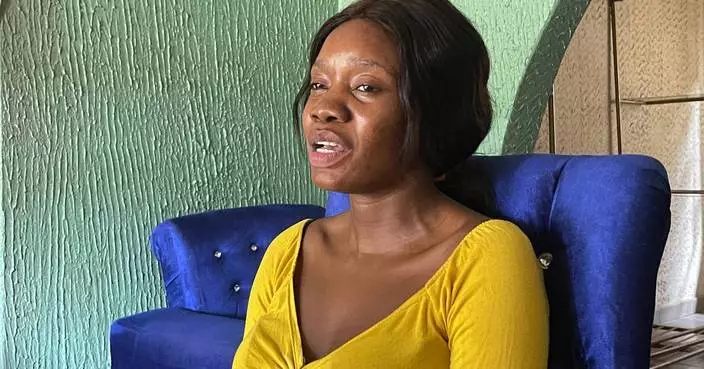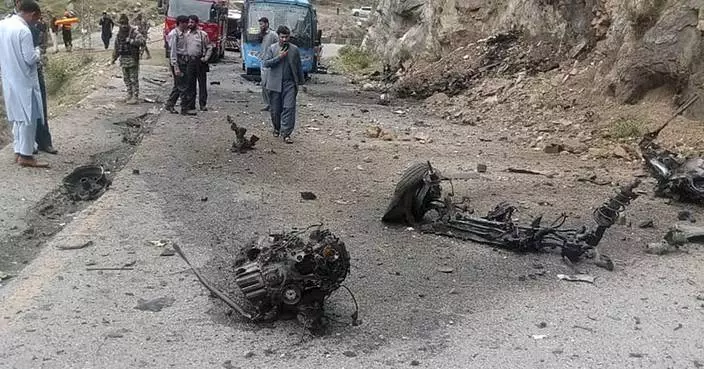A teenage suicide bomber attacked worshippers as they gathered for morning prayers Tuesday at a mosque in northeastern Nigeria, killing at least 50 people, police said, in one of the region's deadliest assaults in years.
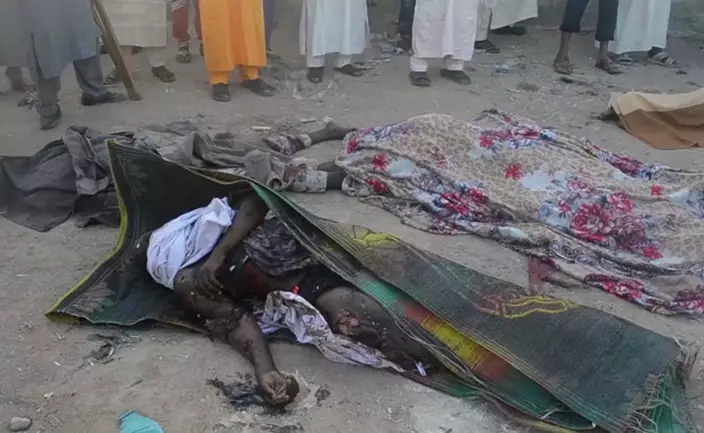
In this image taken from TV, people stand around dead bodies after a deadly attack by a suicide bomber at a mosque in Mubi, Adamawa State, Nigeria, Tuesday Nov. 21, 2017. (AP Photo)
Bloody debris covered the floor inside the mosque in Mubi town in Adamawa state where worshippers had arrived around 5 a.m. Outside, people gathered around the dead.
President Muhammadu Buhari tweeted that he was "saddened by the very cruel and dastardly suicide bombing attack."
"May the souls of the dead rest in peace," he added.
Police spokesman Othman Abubakar told The Associated Press they were "still trying to ascertain the number of injured because they are in various hospitals."
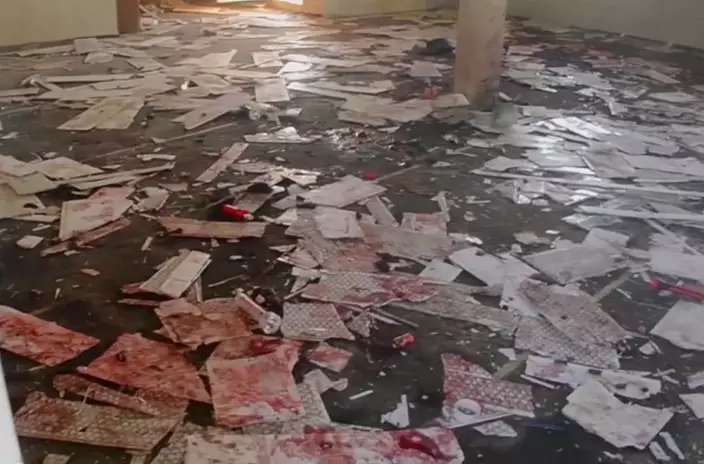
This image taken from TV, shows the interior of a mosque after a deadly attack by a suicide bomber, in Mubi, Adamawa State, Nigeria, Tuesday Nov. 21, 2017. (AP Photo)
While there was no immediate claim of responsibility for the bombing, suspicion immediately fell on the Boko Haram extremist group. The group is based in neighboring Borno state and has been blamed for scores of similar attacks over the years.
Tuesday's attack was the first since Mubi town was liberated from Boko Haram insurgents in 2014.
Boko Haram increasingly has been using teenagers or young women as bombers, many of whom have been abducted.
The police spokesman said the young man detonated his explosives Tuesday while mingling among the worshippers.
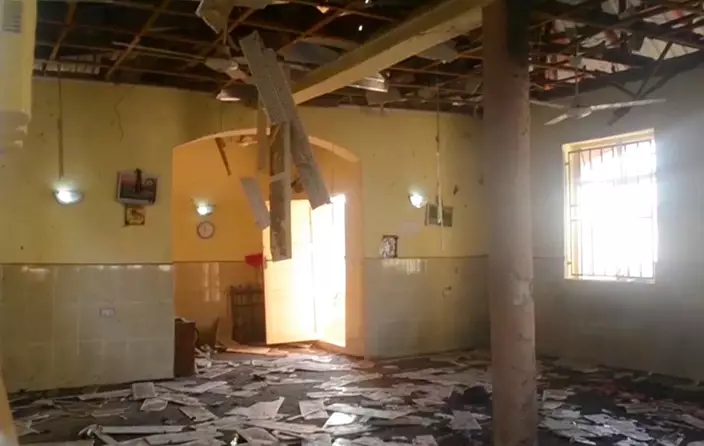
This image taken from TV, shows the interior of a mosque after a deadly attack by a suicide bomber, in Mubi, Adamawa State, Nigeria, Tuesday Nov. 21, 2017. (AP Photo)
While Nigeria's military in recent months has flushed Boko Haram from its forest stronghold, President Muhammadu Buhari's claim late last year that the extremist group had been "crushed" has proven to be premature.
Boko Haram has been blamed for more than 20,000 deaths during its eight-year-old insurgency. The attacks have spilled into neighboring countries and displaced more than 2.4 million people in the Lake Chad region, creating a vast humanitarian crisis.
U.N. Secretary-General Antonio Guterres condemned the suicide attack and reiterated "the solidarity of the United Nations with the Government of Nigeria in its fight against terrorism and violent extremism," U.N. deputy spokesman Farhan Haq said.
The U.N. chief called for those responsible "for these heinous acts to be swiftly brought to justice," he said.
The United States condemned the attack. A statement by U.S. State Department spokeswoman Heather Nauert said "that the victims were targeted and killed in a place of worship demonstrates yet again the brutal nature of the terrorists whose sole aim is to threaten the peace and security of Nigerian citizens."
Nauert said the attack only strengthens the resolve of the U.S. to work with Nigerian and regional partners in countering such threats.
BUENOS AIRES, Argentina (AP) — Iran lashed out at Argentina on Wednesday after the South American country sought the arrest of Iran's Interior Minister Ahmad Vahidi over his alleged involvement in the deadly 1994 bombing of a Buenos Aires Jewish community center.
Without mentioning Vahidi by name, Iran’s Foreign Ministry warned Argentina against “making baseless accusations against citizens of other countries.” The warning Wednesday came a day after Argentina demanded that Pakistan act on an Interpol red notice to arrest Vahidi during an official visit to Islamabad.
Vahidi, who is wanted by Interpol, cut his government trip to Southeast Asia short, making an unexpected return to Tehran Wednesday.
There was no immediate response from Pakistani authorities.
Argentina's renewed push to hold Iran accountable for the worst such attack in its history comes as right-wing President Javier Milei reshapes foreign policy to align more closely with Iran's bitter enemy, Israel, and as tensions surge between the Mideast foes.
In an apparent reference to Israel, Iranian Foreign Ministry spokesperson Nasser Kanani urged Argentina “not to be influenced by those who are enemies of our bilateral relations."
No one has been convicted for planning or carrying out the 1994 bombing that killed 85 people and wounded over 300 others. But in recent weeks — as Iran faces increasing global isolation and sanctions — Argentina has escalated efforts to condemn Iran and its overseas militant network for its alleged involvement. Iran has repeatedly denied any connection to the attack.
In a move cheered by Israel, Argentina's highest criminal court this month ruled the Iranian government had plotted the 1994 attack — as well as a 1992 bombing of the Israeli Embassy in Buenos Aires that killed 29 people. Judges singled out three former Iranian officials for their involvement in the Jewish community center attack — including Minister Vahidi who at the time led the Revolutionary Guard's expeditionary Quds Force. The court also accused the Iran-backed militant Hezbollah group of executing the attack.
Earlier this week Vahidi accompanied Iranian President Ebrahim Raisi to Islamabad, where he met with his Pakistani counterpart to discuss intelligence-sharing. Although expected to continue on with Raisi’s delegation to Sri Lanka, Vahidi abruptly turned back, raising speculation that Argentina's request had complicated his international travel.
He made a surprise appearance Wednesday at a Cabinet meeting in Tehran, where he praised his trip to Pakistan in interviews with state-linked Iranian news outlets. Meanwhile, President Raisi landed in Sri Lanka.
Argentine authorities said Tuesday they had coordinated with diplomats in Pakistan and India to request Vahidi’s detention and extradition to Buenos Aires. “They continue to hold positions of power with total impunity,” a government statement said. Kanani, the foreign minister spokesperson, accused Argentina of making “illegal and false requests” to defame Iran.
For years, Argentina has tried in vain to leverage Interpol red notices to press for the arrests of accused Iranian officials. The country's elusive quest for justice in the 1992 and 1994 bombings has been mired in controversy and alleged government coverups.
Follow AP’s coverage of Latin America and the Caribbean at https://apnews.com/hub/latin-america
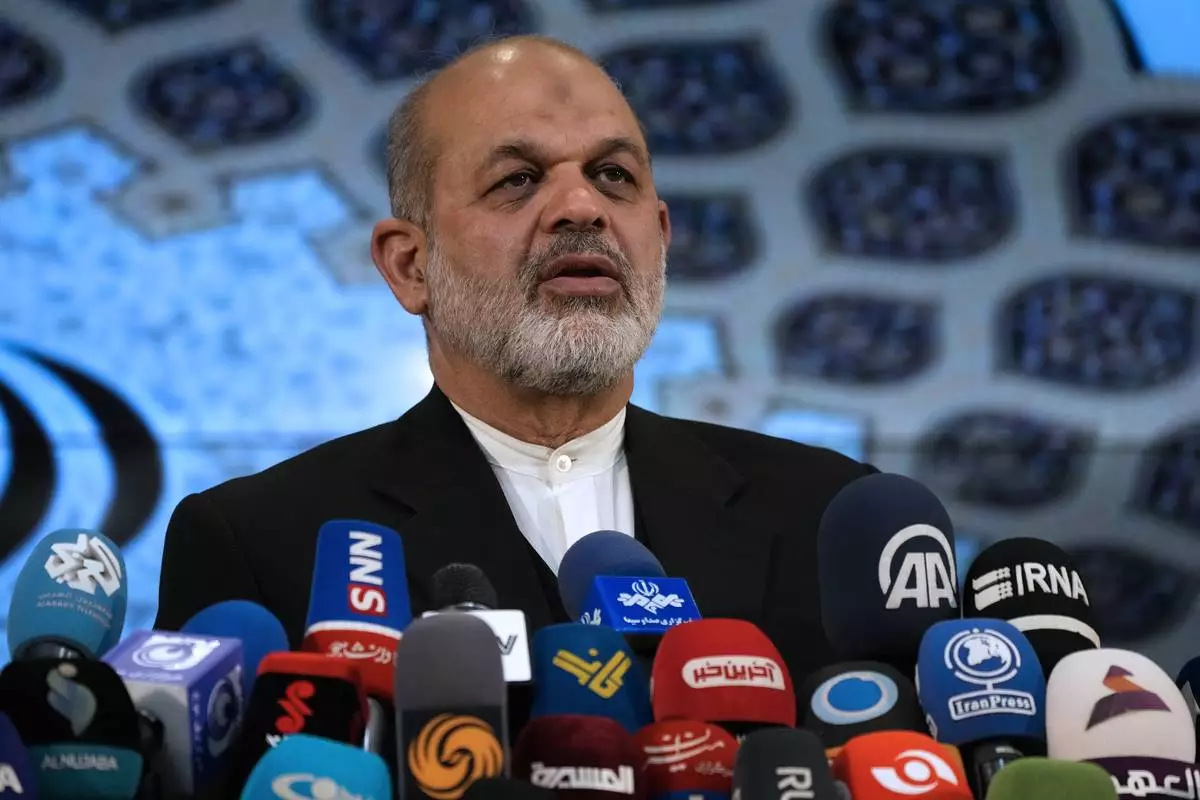
FILE - Iran's Interior Minister Ahmad Vahidi briefs the media on elections in Tehran, Iran, March 4, 2024. Argentina sought the arrest of Vahidi on April 23, 2024, over his alleged involvement in the deadly 1994 bombing of Buenos Aires Jewish community center. (AP Photo/Vahid Salemi, File)







